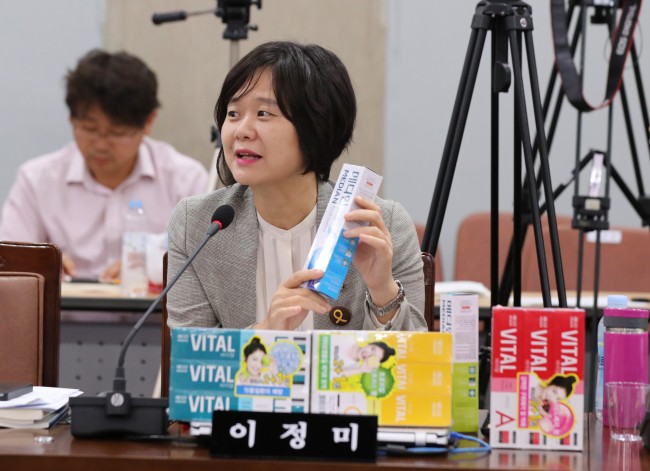Local toothpastes and personal care products were found to contain a toxic chemical substance also used in deadly humidifier disinfectants, albeit in small amounts, an opposition lawmaker said Tuesday.
After a two-week investigation of various products, Rep. Lee Jeong-mi of the minor Justice Party found that some 3,000 tons of Chloromethyl-methylisothiazolone, a synthetic biocide and preservative commonly referred to as CMIT/MIT, were distributed to 30 local and foreign manufacturers through Miwon Chemicals.

Rep. Lee Jeong-mi of the People’s Party questions the environment minister during the parliamentary audit on Tuesday. (Yonhap)
The firms allegedly used the substance to make toothpastes, soaps, body and bath products and laundry detergents, according to the findings.
A total of 11 toothpastes made by the nation’s largest cosmetics-maker AmorePacific were found to contain up to 0.0044 parts per million of CMIT/MIT.
The Ministry of Food and Drug Safety said that it will withdraw the 11 toothpastes, including AmorePacific’s signature brands Pine Salt and Median. The ministry imposed a suspension of business on the firm, forbidding it from producing toothpastes for three months.
“The toothpastes in question contain up to 0.0044 ppm of CMIT/MIT. It is not harmful to human health as it is rinsed away with water after brushing the teeth,” said an official from the drug ministry, citing that up to 14 ppm of the substance is allowed to be used in toothpastes in other countries.
The CMIT/MIT, which is thought to affect the lungs, was designated a toxic substance by the Environment Ministry in 2012. The substance is banned from use in making toothpastes in Korea.
The lawmaker released a list of 30 companies that Miwon Chemicals provided the chemical substance.
On the list were AmorePacific, Aegyeong and Coreana Cosmetics. The foreign manufacturers include two American companies -- Norman Fox & Co and Vivion -- Russian firm Zao Rushkhimset, Japanese Kozekura Shoukai and Indian Lupin Chemicals.
The lawmaker criticized the government for “loosely managing sanitary supplies.”
“The Ministry of Food and Drug Safety, as well as the Ministry of Trade, Industry and Energy, should conduct a comprehensive inspection together to see which products contain the substance,” said Lee in a press release. “It was found that the Drug Ministry has not at all overseen the use of CMIT/MIT and it was not even aware of the relevant facts.”
AmorePacific apologized Tuesday to customers for causing concerns over safety of its toothpastes.
“We found that a very small amount of CMIT/MIT was contained in sodium lauryl sulfate, which we were provided by a chemical company,” it said in a press release. “We feel the responsibility for using improper substance. We should have more thoroughly managed the use of substance to offer safe products to customers.”
The company and the ministry were allegedly not aware that the harmful substance was used to make products until the lawmaker informed them.
The firm said that customers who bought the 11 recalled toothpastes can return them or exchange them from nearby stores. There is no need to present a receipt. Used items can also be returned.
AmorePacific and Aekyung account for 25.6 percent and 17.8 percent, respectively, of the toothpaste market, according to industry watchers. AmorePacific’s toothpaste brand Median alone has 20.1 percent market share.
The revelation comes amid persistent suspicions over the safety of everyday products, as the country saw toxic humidifier sterilizers claimed more than 900 lives over the past decade.
South Korean authorities confirmed a link between humidifier disinfectants and lung-related diseases in 2011.
By Ock Hyun-ju (
laeticia.ock@heraldcorp.com)






